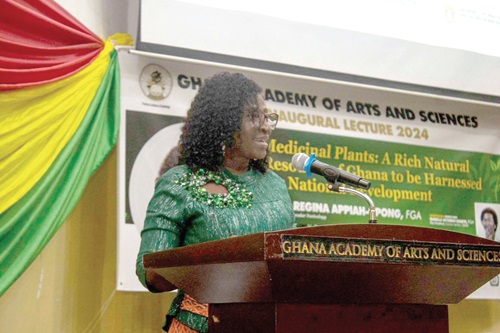Research scientists and herbal medicine practitioners have been urged to embark on rigorous scientific studies and clinical trials to facilitate the acceptance of herbal medicines by mainstream medical practitioners.
Building trust in herbal medicines through data collection, assessment, monitoring and prevention, including the adverse effects of such medicines could enable the country to benefit immensely in both health care and revenue generation.
A Professor of Toxicology at the Noguchi Memorial Institute for Medical Research (NMIMR), Regina Appiah-Opong, said “herbs have been shown to be capable of producing a wide range of undesirable or adverse reactions, some of which are serious injuries and life-threatening conditions, therefore, thorough toxicity assessment of plant medicines is necessary”.
She was speaking during her inaugural lecture at the Ghana Academy of Arts and Sciences (GAAS) in Accra, on the topic: “Medicinal plants: A rich natural resource of Ghana to be harnessed for national development.”
Revenue generation
Prof. Appiah-Opong described the medicinal plant sector as a gold mine which could generate huge amounts of revenue for the nation with the right investment and policy direction.
She said plant medicine had become a major source of income and livelihood, employing millions of people in developing and industrialised countries and contributing significantly to Gross Domestic Products (GDPs) globally, with the largest markets being China, France, Germany, Italy, Japan, Spain, Britain and the US.
“In 2023, China’s export of traditional Chinese medicine products, including herbal medicines, was valued at around $ 1.15 billion.
“Also, interest in the use of ethnobotanicals is increasing in industrialised nations. In 2012, WHO data showed that almost half the population in countries like US, Australia, France and Canada, regularly use some form of T&CM while Japan is the world's largest consumer of natural medicines per capita,” Prof. Appiah-Opong added.
She further said that countries such as Egypt, Morocco, South Africa, Malawi and Tanzania were generating significant economic dividends from herbal medicines.
Prof. Appiah-Opong said that although currently, the revenue generated from medicinal plants in Ghana was unknown, about 951 tonnes of crude herbal medicines, with an estimated value of $ 7.8 million, were traded in the country’s herbal markets in 2010.
She, therefore, called for strategic investment for research and development, coupled with standardisation and fair regulations to address policy gaps to expand herbal medicine production and growth of the market.
Conservation
The research scientist, however, said that while the country refocused on harnessing medicinal plants for revenue and national development, it must also adopt strategies, including documentation of indigenous knowledge of herbs, to conserve species.
She said to avoid the extinction of medicinal plants, human activities, such as over-exploitation, indiscriminate collection, uncontrolled deforestation and habitat destruction through illegal mining, also known as galamsey, must be stopped.
Prof. Appiah-Opong said the government must also lead the effort towards the cultivation of medicinal plants that were facing extinction, and put in place a policy to replace harvested medicinal plants, including the establishment of large medicinal plant plantations to create job opportunities in the country in line with SDGs Eight and Nine.
“Ghana can soar high in the global market and reap significant revenue from medicinal plants for national development if all hands are on deck.
“The government, policymakers, regulatory bodies, traditional medicine practitioners, academia, research institutions and other stakeholders can join hands together in that direction,” she added.

